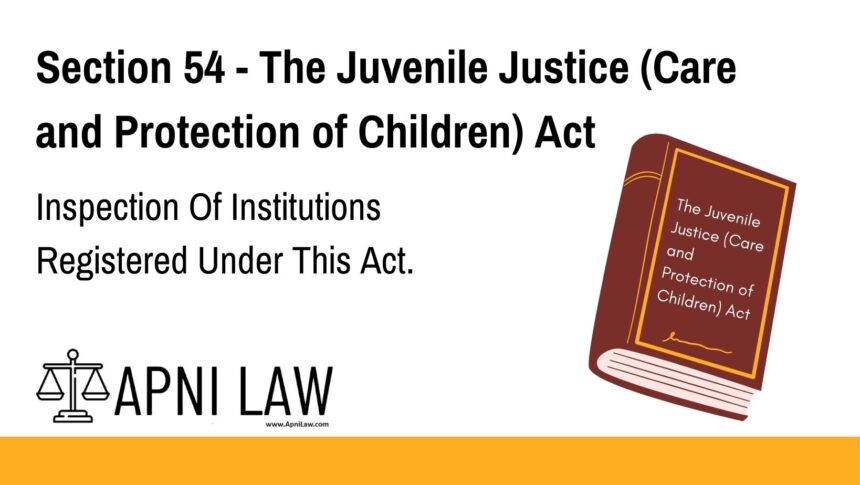Code: Section 54 – Inspection of Institutions Registered Under This Act
(1) The State Government shall appoint inspection committees for the State and district, as the case may be, for all institutions registered or recognised to be fit under this Act for such period and for such purposes, as may be prescribed.
(2) Such inspection committees shall mandatorily conduct visits to all facilities housing children in the area allocated, at least once in three months in a team of not less than three members, of whom at least one shall be a woman and one shall be a medical officer, and submit reports of the findings of such visits within a week of their visit, to the District Magistrate, for further action.
(3) On the submission of the report by the inspection committee within a week of the inspection, appropriate action shall be taken within a month by the District Magistrate and a compliance report shall be submitted to the State Government.
Explanation of Section 54 of the Juvenile Justice Act
Section 54 ensures regular and transparent monitoring of child care institutions. It empowers the State Government to appoint inspection committees at both state and district levels. These committees are responsible for checking if the institutions follow the rules and meet the required standards of care.
Importantly, the law mandates that these committees must include at least one woman and one medical officer. This ensures diverse perspectives and medical oversight during inspections. Furthermore, the law requires the committee to visit all child care institutions at least once every three months.
After each visit, the committee must submit a detailed report to the District Magistrate. Based on this report, the Magistrate must take necessary actions within one month and then submit a compliance report to the State Government.
Key Highlights:
- The State Government must appoint inspection committees.
- Each committee must visit institutions at least once every three months.
- Each inspection team must include a woman and a medical officer.
- Inspection reports must be submitted within one week.
- The District Magistrate must act on the report within one month and report back to the State.
Illustration
Example 1: Routine Inspection Uncovers Issues
An inspection committee visits a district child care home. The team includes a woman officer and a doctor. During the visit, they find poor sanitation and lack of medical supplies. They submit their report within a week. The District Magistrate responds by ordering immediate improvements and follows up with a compliance report to the State Government.
Example 2: Timely Action and Compliance
Another inspection team finds no major issues but recommends better recreational activities for children. The Magistrate acts on the suggestion and ensures new programs are launched within a month. A detailed compliance report is submitted to the State, highlighting the positive changes.
Common Questions and Answers
1. Who appoints the inspection committees?
The State Government appoints the inspection committees for both the state and district levels.
2. How often must institutions be inspected?
Every child care institution must be inspected at least once every three months.
3. Who should be on the inspection team?
Each inspection team must have at least three members, including one woman and one medical officer.
4. What happens after the inspection?
The committee submits its report to the District Magistrate within a week. The Magistrate takes necessary action within a month and then informs the State Government through a compliance report.
5. Why is regular inspection important?
Inspections ensure child care homes follow safety, health, and welfare guidelines. They help detect and correct problems early to protect children.
Conclusion
Section 54 of the Juvenile Justice Act focuses on accountability. Regular inspections by qualified teams keep institutions transparent and responsible. With defined timelines and mandatory reporting, this section ensures that the well-being of children in care remains the top priority.
📘 For more legal insights, visit ApniLaw and explore every section of the Juvenile Justice Act with ease.








